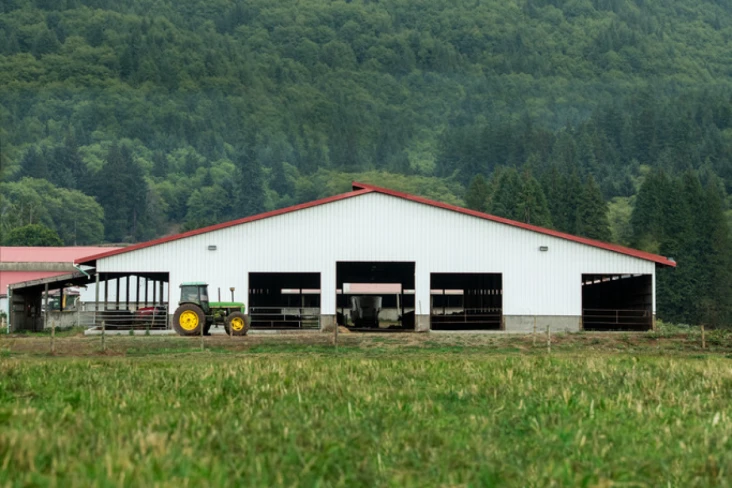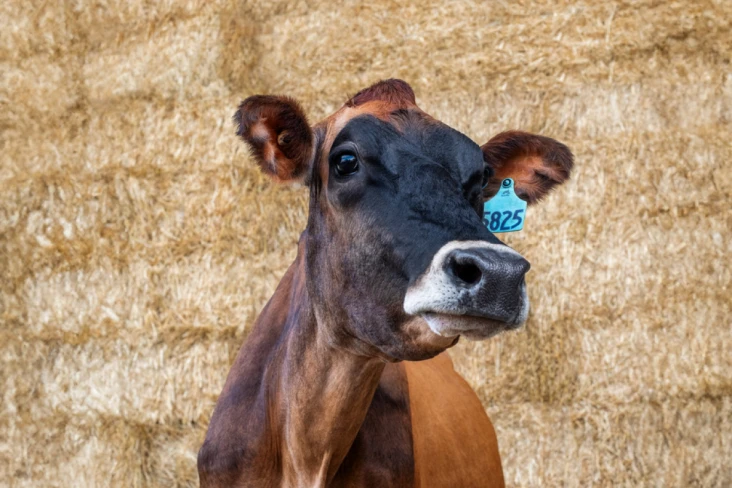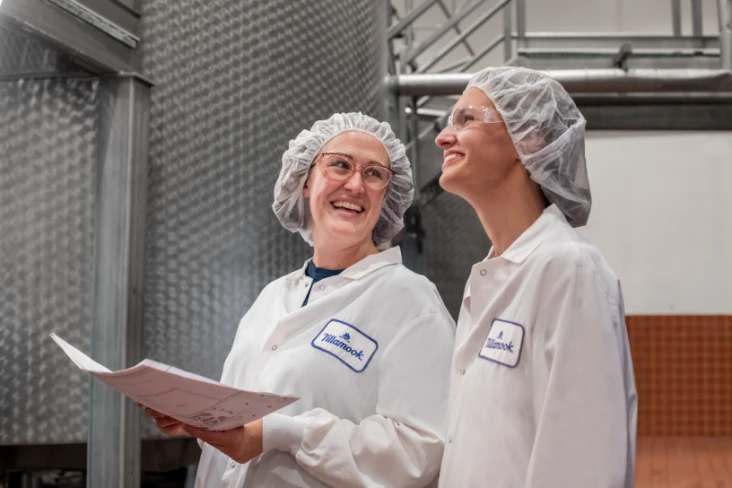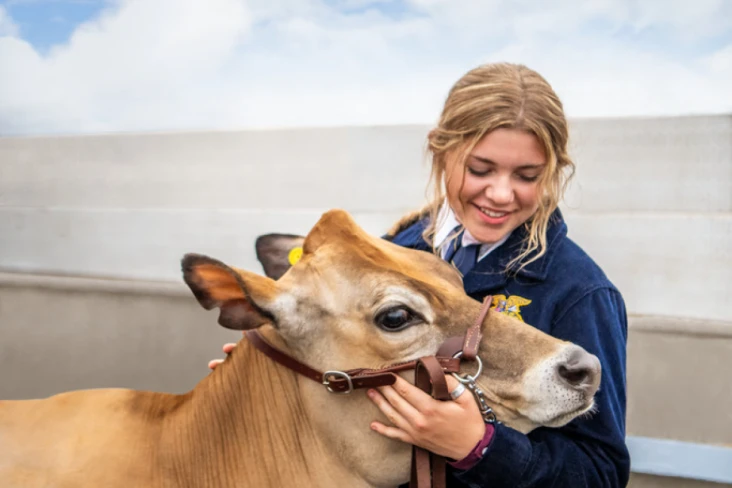As a farmer-owned and farmer-led dairy cooperative, the Tillamook County Creamery Association (TCCA) recognizes that animal welfare is critical to the success of our business. Maintaining comfortable, nourished, cared-for animals is simply the right thing to do. And it results in consistent, reliable, high-quality milk — the main ingredient for all our products.
Additionally, animal welfare has been identified as one of the most important topics to our customers including the grocery, retail and foodservice companies that stock our products, as well as our consumers. Our 2021 Materiality Assessment, Consumer Insights Surveys and questionnaires from our customers and feedback from consumers indicate that people want to know animal care is held to a high standard at TCCA.
Our farmer-owners and other milk suppliers are selected based on whether they share our values, standards and animal welfare practices. Maintaining high animal welfare standards at every farm enables accountability throughout our supply chain.
General Approach: TCCA’s Stewardship Management System includes policies, procedures, documentation, measurement and communication of our practice and performance. A key component of this is our board-approved, third-party reviewed 2017 Stewardship Charter, which defines our vision and commitments to six key stakeholders. While most think of stakeholders as people or organizations, we include cows as a stakeholder and consider them when making business decisions.
Written Policies for All Milk Suppliers: Our TCCA Cooperative Member Handbook includes an animal welfare section that outlines requirements and programs listed below; all members of our cooperative must adhere to them. Additionally, our Contract Milk Suppliers Handbook and our Co-Manufacturer Expectation Manual together guide the contractual requirements for milk sourcing from our contract suppliers, including policies on animal welfare and milk quality. Both manuals cover the same animal care and welfare standards.
TCCA requires that all milk suppliers produce milk in adherence with the internationally accepted five freedoms of good animal welfare, inspired by the World Organization for Animal Health:
Provide adequate food and water.
Provide adequate comfort and shelter.
Provide proper handling and environments, appropriate to the species and use.
Prevent and treat disease and injury.
Prevent and minimize fear, pain, stress and suffering.
FARM Program: All farmer-owners and contract milk suppliers participate in the Farmers Assuring Responsible Management (FARM) program or equivalent. FARM was designed as a common set of practices for the humane and ethical treatment of dairy cows. The FARM Animal Care Reference Manual includes subjects such as cow nutrition, animal health, farm environment, protocols, safe facilities and mandatory training of all farm employees and owners on animal-care practices. The integrity of the FARM program is upheld by on-farm assessments, conducted by second-party and third-party industry experts. In 2022, we confirmed that all milk sourced by our contract manufacturing associates is also FARM compliant; therefore, 100% of the milk we use to make TCCA products is FARM compliant.
Farm Evaluation Process: TCCA’s Farm Services Team (second party) or a third-party evaluator conducts annual evaluations to ensure our farmer-owners’ farms remain compliant with the FARM program, the Cooperative Member Handbook, health and food safety standards and best management practices.
Key Players: TCCA’s Farm Services Team ensures compliance with internal policies, government regulations and industry best practices pertaining to animal welfare. Our Director of Farm Services, a licensed veterinarian with years of experience caring for farm animals, serves as the liaison between our farmer-owners and TCCA. Her team is comprised of staff members who regularly monitor data and inspect the farms of our farmer-owners and direct-contract milk suppliers. Our Director of Environment and Community Impact and her team are responsible for maximizing our net positive impact throughout the entire value chain. Our Farm Services Team and Quality Control Team work diligently to ensure that co-manufacturers’ milk suppliers also comply with our animal welfare standards. Our Director of Farm Services is involved with selection and assessment of co-manufacturers and their milk suppliers, including setting animal-care expectations, visiting farms and assessing quality data. Together, these key leaders and their teams work to provide assurance that every cow is treated with care.
Key Performance Indicators: TCCA utilizes somatic cell count measurements in milk as a proxy of health and wellness in cows, a standard recommended by The Dairy Sustainability Framework (DSF). The average somatic cell count of DSF members in 2021 was 178,478 cells per milliliter. At TCCA, our goal is to have 100% of all milk used to make TCCA products reporting below 200,000 cells per milliliter.
KPI: In 2022, 81.4% of milk-pounds entering Tillamook and Boardman manufacturing facilities was below 200,000 somatic cell count per milliliter and our SCC average was 152,000. When including milk supplied to co-manufacturing plants, 85% of the total milk supply used to make TCCA products was below 200,000 somatic cell count per milliliter.
We also track Milk Urea Nitrogen (MUN) (in mg/dl) from farmer-owners as a proxy for animal nutrition (adequate protein) and ammonia emissions. We strive to have 100% of our milk-pounds between the desired range — 8 to 14 mg/dl MUN. We are working on gaining supply chain transparency into our full milk supply; currently, we only have MUN data from our farmer-owners and all milk going into our plants.
KPI: 97.8% of milk-pounds entering Tillamook and Boardman manufacturing facilities was within the desired range of 8 to14 mg/dl MUN in 2022.
Internally, we also track the number of Mandatory Corrective Action Plans and number of Continuous Improvement Plans on farmer-owners’ farms, based upon the results of farmer-owner farm evaluations. We require these to be addressed within 60 days, which is much quicker than the industry standards for FARM. Our goal is to continually improve and address any corrective actions.
The FARM program requires that farms maintain a written herd health plan. This plan is developed in consultation with a veterinarian to prevent, diagnose, control and treat disease or injury of all cows. Farmers are also required to maintain a Veterinarian-Client-Patient-Relationship (VCPR) signed by the farm owner/manager and a veterinarian of record. The veterinarian assumes responsibility for medical judgments regarding the health of the animals, and the client has agreed to follow the veterinarian’s instructions. Antibiotic protocols, withholding times and records are required to be kept and reviewed annually with the veterinarian. All employees are also required to have annual documented training on animal care protocols.
Special care is necessary to raise healthy calves that will become milk cows in the herd. Newborn calves have underdeveloped immune systems, making them more susceptible to infections and disease. Calves are typically housed in individual stalls or group pens with calves of similar age; this helps prevent the possibility of injury and exposure to pathogens from full-size animals. After a calf is born, farmers bottle-feed each new calf and carefully monitor the amount of colostrum — the mother cow’s first milk, which is full of antibodies. Calves are monitored daily for nutrients and checked for illness.
Dairy farmers work closely with animal nutritionists to optimize cow nutrition. While each herd may have different nutritional requirements, every cow’s diet consists of forages and grains to promote good health, growth and milk production. The forage portion generally consists of grass, grass silage, alfalfa and corn silage. The grain portion is typically a mix of grains, including corn and barley. Cows are also given a vitamin and mineral supplement to support long-term health. Agricultural by-products such as cotton seed, cannery corn and spent grains (from the production of human food, fuel and fiber) are also included in a cow’s diet. By providing nutrient-rich food for cows, these by-products do not end up in landfills.
Cows that supply milk to TCCA live in many different environments. Many dairy farms choose to house their cows in barns full-time, while others have their cows on pasture during some parts of the year. It all depends on climate and a number of other factors. Both types of farms, with or without pasture access, are able to keep cows healthy and comfortable. Tillamook works with many different types of farms. The size or style of farming does not impact quality care, and all the farms we work with meet our high standards for animal welfare, cow comfort, milk quality and other benchmarks for environmental stewardship and worker safety. In every type of housing, cows are provided with a comfortable, clean place to rest and access to feed and water. Some farmers opt to use a dry lot fenced-in area and others prefer to use free-stall options. In free-stalls, cows live in large, well-maintained barns where they are free to wander, socialize and eat as they please. These barns have an open-sided design that provides shelter, while still allowing access to daylight and fresh air. Typically, cows do not enjoy standing outside in adverse weather conditions and will opt to stay inside in these situations. A dry lot is a large fenced-in area with feeding areas; resting areas with shelters; and room for cows to wander, socialize and eat. These facilities are used in arid climates.
On a typical dairy farm, cows are milked twice per day, though variation may exist based on farmer preference. Some dairy farms use robotic milking systems, where milking stalls are available to dairy cows throughout the day, allowing cows to choose when they would like to be milked. A cow is typically milked for five to 10 minutes before returning to her regular activities: eating, socializing and resting. For context, this means cows rest 12 to 14 hours per day and eat for about four hours per day.
Following a continuous improvement model, we are constantly striving towards improving our practices. The National Dairy FARM Program Animal Care Version 4.0 that we follow recently announced updates. The new version covers additional improvements around calf and cow care, employee trainings and closer farmer-veterinarian relationships. We are also looking into additional visibility to milk quality, worker safety and environmental stewardship at farms that supply milk to our co-manufacturers.

U.N. Sustainable Development Goals
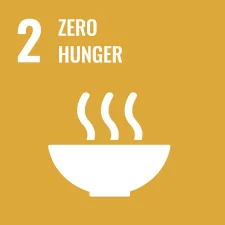
Goal 2
End Hunger, Achieve Food Security and Improved Nutrition, and Promote Sustainable Agriculture
We create high-quality, wholesome products for consumers around the world. High-quality products stem from sustainable practices, including good cow care.
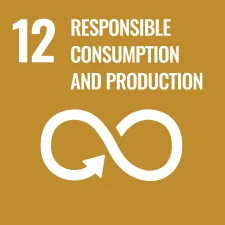
Goal 12
Ensure Sustainable Consumption and Production Patterns
Our farmer-owners work with animal nutritionists in order to optimize each cow’s diet. Together, they work to use natural resources efficiently and responsibly.
